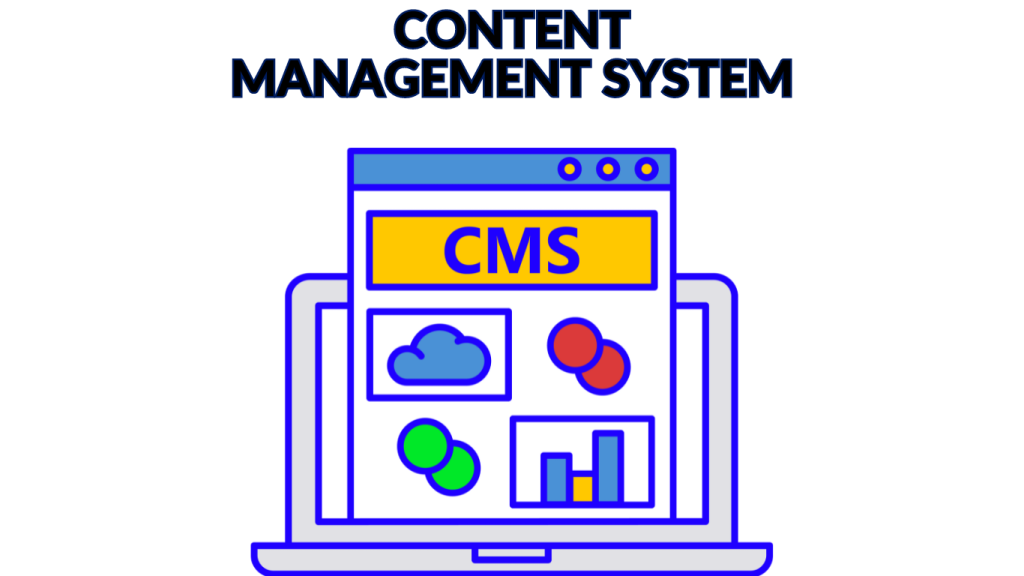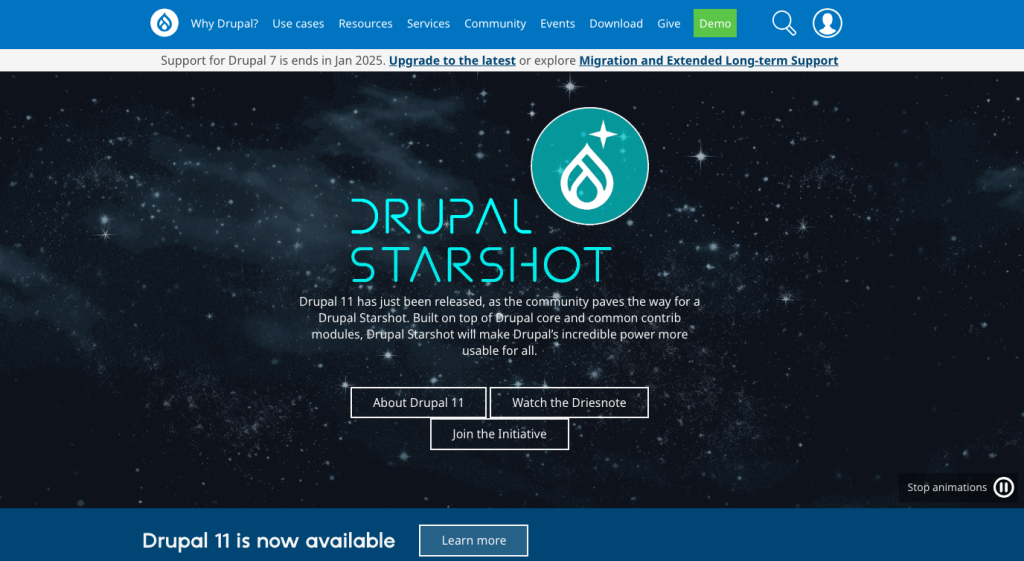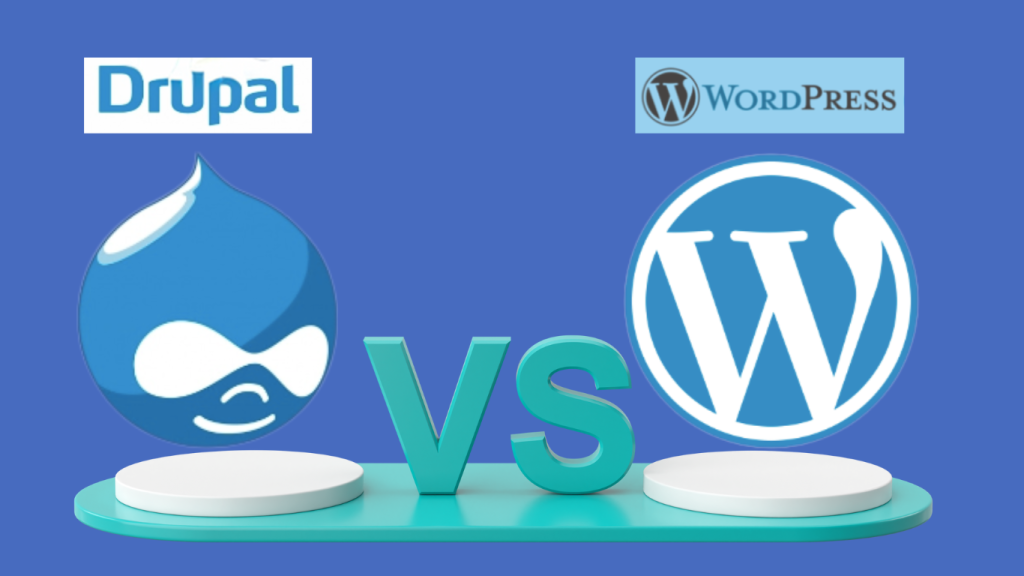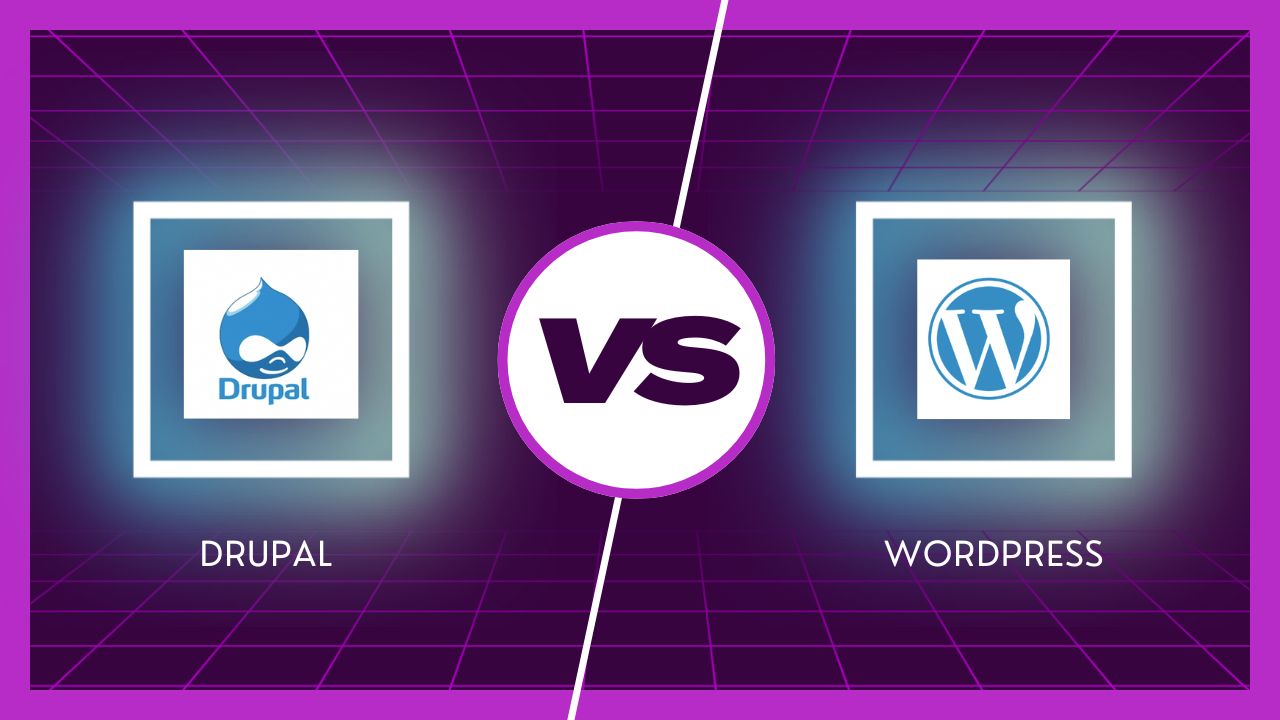Drupal vs WordPress are the two giant contenders of the web today however, which one best suits your vision? Both Drupal and WordPress have unique advantages and disadvantages, so which option is best for you will depend on your unique business requirements.
When building a website, your choice of the perfect CMS is like picking the right pair of shoes. It’s that serious for your project’s future and online presence. In this in-depth Drupal vs WordPress comparison we’ll help you pick the platform that will work best for your website goals.
But First, What is CMS and Why Should You Care?

A Content Management System (CMS) is a software application that allows users to quickly create, manage, edit, and publish content on their website without any prior coding knowledge and expertise.
With a CMS rather than writing code, you can download or buy templates and extensions to customize your website appearance and functionality. In addition to much more, you can have multiple people working on the same tool’s back end.
The corporate sector is renowned for acronyms like SEO, CRM, SERP, CDN, and CMS. CMS, or content management system, is said to have created over 68 million websites and is ideal for those with limited time and budget.
Here are some aspects of Content Management Systems (CMS) that benefit platforms like Drupal or WordPress:
- Collaboration: Workflows are enhanced by allowing multiple users to collaborate on the site simultaneously.
- User Roles and Permissions: Set up user roles to enable secure communication without disrupting the website’s operation.
- SEO Features and Extensions: Tools to improve your website, including sitemaps, alt text, and meta tags, are included.
- Security Features and Extensions: Additional and built-in security tools such as SSL and firewalls are available.
- Predesigned Templates: Use responsive templates to quickly change the appearance of your website.
- Easy Upgrades: You can easily make upgrades without needing a developer.
- Blogging Features: Built-in blogging capabilities to increase website traffic and lead generation.
- Content Scheduling: Easily schedule landing pages, blog posts, and more.
- Simple Access: You can access and manage your website from any internet-connected device.
Some of the most popular CMS platforms other than Drupal and WordPress are:
Get exclusive access to all things tech-savvy, and be the first to receive
the latest updates directly in your inbox.
- Content Hub
- Joomla
- Magento
- Webflow
- Ghost
- Sitecore
But today we’re only unlocking Drupal vs WordPress in detail, the rest for some other time.
Drupal vs WordPress: Here’s an In-depth Overview
Time to explore Drupal vs WordPress for our readers. Both CMS Platforms are the two kings of the web, each with an army of loyal followers.
What is WordPress: When Does it Make Sense
At its core, WordPress excels in all other areas! It’s the simplest most popular way to create your website. WordPress is often considered one of the strongest CMS alternatives for Drupal.

Often for magazines, eCommerce sites, nonprofit organizations, small-to-medium enterprises, or startups. WordPress is a content management system that is open-source and free and modification by everyone licensed under GPLv2.
With over 40% of all websites running on it, and controlling a 65.1 % market share globally, WordPress is the most widely used content management system worldwide. It began as a blogging platform in 2003 and has since developed into a flexible and easy-to-use CMS.
Users love how simple it is to use, marketers and non-technical developers often think highly of it, and compared to Drupal, it is typically more widely used.
Remember that WordPress.org and WordPress.com are not the same things if you self-host. Additionally, you want to create websites using self-hosted WordPress.org most of the time. You have more control over your self-hosted WordPress.org in addition to having access to all the advantages and benefits of the WordPress community.
Key WordPress Features
- User-Friendly Interface: Users with little to no technical experience can easily utilize WordPress thanks to its well-known user-friendly interface.
- Huge Plugin Library: With over 50,000 plugins available, WordPress users may add practically any website functionality.
- Theme Variety: WordPress can be tailored to almost any website thanks to the thousands of free and paid themes available.
Who’s Using WordPress: Real Examples
WordPress is being used by almost every individual, big enterprise, and content-focused site. Even the site where you’re reading this article uses WordPress.
Let’s explore some of our favorite examples and exactly which big websites are using this CMS platform.

- Whitehouse.gov
- Sony Mobile
- Mercedes Benz
- TechCrunch: a popular news and media outlet using this CMS for content management and scalability.
- The New Yorker
- The University of Washington
- Portfolio Websites: helps designers, artists, and freelancers to build eye-catching websites that highlight their work
What is Drupal: When Does it Make Sense

Like WordPress, Drupal is a powerful and flexible content management system renowned for its security and scalability. Developers frequently choose Drupal vs WordPress for creating intricate, expansive websites that need unique features.
Drupal is also an open-source, free platform like WordPress that anyone, even those without technical knowledge, can use in groups or individually. PHP is the programming language used to write it. In addition to being ready for use, the software includes add-on modules and an online installer.
Drupal is easier to mess up if the programmer or agency you hire is inexperienced because it is often more sophisticated.
Having said that, Drupal gets harder to mess up after the initial learning curve is overcome if it is integrated into a professional DevOps workflow that is executed by an experienced team utilizing configuration management, version control, and other add-ons like continuous integration and automated testing.
As a CMS, You may use this platform to create a variety of website kinds, Drupal is especially well-liked by businesses, governmental organizations, academic institutions, and eCommerce service websites.
Key Drupal Features
- Simple content production: Drupal makes content creation and management easier with its user-friendly interface and word processing tools like WYSIWYG (What You See Is What You Get).
- Multilingual support: It is available in over 100 languages and offers translations for various elements, including user interfaces and basic content forms. You can also contribute translations.
- Changing the layout of your website without having to know the code: this Drupal feature allows you to change the layout of your website by only dragging and dropping a block.
- SEO: Drupal’s numerous built-in tools, such as those for managing keywords, building sitemaps, and writing metatags, make it easy to handle positioning.
- Security: Drupal’s security features are regularly updated, Also, the system is designed to defend against cross-site scripting and brute-force attacks.
Who’s Using Drupal: Real Examples
Drupal vs WordPress is being widely used in Government, Academic, Media, Non-Profit, and Corporate Websites.
Let’s explore some of our favorite examples and exactly which and how the CMS platform, Drupal is being used:
- Government Websites: Popular for robust security and scalability, used by the Australian Government and the U.S. Department of Energy.
- Academic Institutions: Harvard, Stanford University, and other prestigious universities rely on Drupal for managing large online content.
- Media and Publishing: NBCUniversal and The Economist manage highly trafficked news and content websites.
- Non-Profit Organizations: The United Nations and Amnesty International use Drupal for global engagement.
- Corporate Websites: Pfizer and Tesla use Drupal for their corporate websites.
Drupal Vs WordPress: Comparison in Detail
Let’s dig deeper into the Drupal vs WordPress feature comparison in complete detail:

Drupal vs WordPress: Ease of Use
Ease of Use in WordPress is very beginner-friendly because it makes it easy to go from nothing to a fully functional website in just one day. especially for individuals who are new to web development, thanks to its user-friendly interface and wealth of online resources.
On the other hand, the flexibility and power of Drupal vs WordPress come with a steeper learning curve it can be argued that it is more difficult to learn than WordPress and requires more time and effort to grasp.
Drupal 10 has a new theme generator tool that makes it easier to create custom themes, which is one of its key advantages.
The content management system in WordPress is simple to use and effective, especially with the Gutenberg editor.
Complex websites can benefit from Drupal’s more advanced content management features, which create new content types and fields.
Drupal vs WordPress: Speed
One of WordPress CMS’s weaknesses is speed. It is mostly dependent on the optimization of the web pages. Drupal alternatives may cause website builder speed issues for the following reasons:
- Several external scripts.
- The quality of the hosting provider.
- Optimizations on the server side.
- Content that isn’t optimized.
- Plugins with poor coding.
- Sluggish themes.
It provides lightning-fast server response and communication speeds in this way.
Drupal vs WordPress is an excellent Content management system choice for projects requiring a high level of performance because it is designed to manage busy websites and massive volumes of content.
WordPress is also highly capable of high performance, but to keep it running quickly, especially on large websites, it frequently needs plugins, optimized themes, and hosting services.
Drupal facilitates the creation of extremely effective and quick-loading webpages. This CMS enables lightning-fast server communication and faster response times because it is not very resource-intensive.
This CMS is incredibly capable of managing hundreds of pages on a website. You can add other extensions to improve performance, such as the ability to cache websites.
Drupal vs WordPress: SEO
To score highly in search engine results and increase website traffic, SEO is essential it makes or breaks it. Fortunately, SEO tools are integrated into most blogging platforms.
WordPress has XML sitemaps that are automatically generated, which enhances your website’s search engine exposure. But only Business-grade customers may utilize Google Analytics, add third-party plugins, and access its sophisticated SEO tools.
In comparison Drupal vs WordPress offers modules or codes that modify or add new functionality to websites. These codes are made up of PHP or JavaScript files. Adding SEO modules for meta tags that manage meta data, site verification, XML sitemaps, page titles, and Google Analytics to your website is a simple process. This CMS is a preferred choice for large complex websites looking for more advanced SEO controls.
Drupal vs WordPress: Security
Drupal is a popular option for websites where data protection matters most because of its robust security features. Despite being secure, WordPress is more open to assaults because of its extensive usage and dependence on third-party plugins. However, WordPress may also be properly secured with the right management and security plugins.
Drupal vs WordPress: Customization
There are an astounding 55,000+ plugins available in the WordPress directory. With 6.3 million websites powered by it globally, WooCommerce, its most popular e-commerce plugin, is widely used.
Drupal vs WordPress offers more than 40,000 modules for customizing websites. Version 10’s new Olivero theme improves user experience with a contemporary UI.
So WordPress clearly wins here!
Drupal vs WordPress: Community and Support
In terms of support both CMS, Drupal vs WordPress provide support. WordPress has a vast active community provides a beginer friendly localized email support, contact forms, countless community forums, tutorials, and live chat help that is available for users at all times on weekdays.
Compared to WordPress, Drupal has a smaller community that is very dedicated to developement and security, and provides robust community support via Stack Exchange, Core Issue Queue, forums, and community documentation.
It’s documentation is more technical that is for advanced users or developers. Finding developers can be the challenging and expensive part.
Drupal vs WordPress: Comparing Cost
When considering cost in Drupal vs WordPress, the more budget-friendly option is WordPress due to the huge free plugins and themes it provides that lowers the development costs, and has a user-friendly setup also generally used for small-Medium scale projects. Only the premium themes or plugins are paid.
Price: WordPress Starter is available for $5 per month and includes 6 GB of storage, the option to take payments, integration with Google Analytics, and a free custom domain for a year.
On the other hand, Drupal vs WordPress isn’t very cost effective even for the initial setup and development of your website. Website owners need professional expertise, as it’s more complex compared to WordPress, so maintenance cost are also higher eventually.
Users say that a Drupal project that requires little custom development could cost between $30,000 and $40,000 and need six to eight weeks of labor.
Drupal vs WordPress: Installation
Because it’s so simple to set up, WordPress has a huge user base—more than 500 new websites are made on the platform every single day. On the other hand, because of its enormous customization options, Drupal vs WordPress is favored for complex and large-scale projects, even though its installation process is more complex.
Government websites and educational establishments especially use Drupal as their content management system. 71% of the top 100 institutions are using Drupal as their content management system, according to a report by Drupal.
Conclusion: Which CMS Should You Choose?
Choosing the right content management system for your website requires having the necessary information and understanding to make an informed decision. Our final recommendations when deciding Drupal vs WordPress is to first make a detailed research of your specific business needs.
If you’re looking for an affordable CMS that’s isn’t too hard to set up initially and offers plenty of Plugins go for WordPress.
On the other hand for owners building more complex websites that will be used in large-scale projects like government agencies or an educational institute and require a technical professional to set it up Drupal is an appropriate choice.
Both CMS platforms, provide strong capabilities to help you realize your vision, our detailed guide covers key features of both that’ll help you make an easy choice!
Besides the article, we have a video tutorial for you. Go and watch it right now!
FAQ’S
What are the key differences between Drupal and WordPress?
The intricacy and versatility of Drupal vs WordPress are their main distinctions. With so many themes and plugins available, WordPress is an easy-to-use platform that is perfect for beginner. In contrast, Drupal is more complicated but provides more scalability and customization, which makes it perfect for complicated or large-scale projects.
Which is better for SEO, Drupal vs WordPress?
Both Drupal vs WordPress are SEO-friendly, although they take different approaches. Yoast SEO is one of the many SEO plugins available for WordPress that simplify optimization. Drupal comes with modules for extensive customization and built-in SEO tools. The decision is based on your level of experience and particular SEO demands.
Which CMS Drupal vs WordPress offers more community resources and support?
WordPress offers a larger user base and comprehensive community resources, while Drupal caters primarily to developers and complex users, making the choice based on specific needs. So Drupal isn’t very resource intensive.
Can i integrate WordPress or Drupal with third-party services?
In response, Drupal vs WordPress both allow for third-party service integration. Numerous plugins for WordPress allow it to be integrated with services like social media, email marketing systems, and analytics tools. Drupal also facilitates custom programming and modules for third-party integrations.
How to build a WordPress Website?
Purchasing a web hosting package and a domain name is the first step in creating a WordPress website. The greatest hosting providers frequently provide cost-effective extras like a free SSL certificate and domain name. Install WordPress from there using the web hosting panel. Install plugins, personalize pages, and choose and set up a theme. Observe the detailed guidelines for creating a WordPress website.



